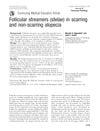Topical Mechlorethamine Restores Autoimmune-Arrested Follicular Activity in Mice with an Alopecia Areata-Like Disease by Targeting Infiltrated Lymphocytes
March 2003
in “
Journal of Investigative Dermatology
”

TLDR Mechlorethamine treatment regrew hair in mice by killing immune cells causing hair loss without harming hair follicles.
In the 2003 study, 24 female C3H/HeJ mice with an induced alopecia areata-like disease were treated with topical mechlorethamine. The treatment led to full hair regrowth on the treated side of the mice after 10 weeks, while the control side showed no improvement. The study demonstrated that mechlorethamine effectively eliminated CD4 and CD8+ lymphocytes from the skin, which are key in the disease's progression, and was more cytotoxic to lymphocytes than to skin and follicular cells. Additionally, mechlorethamine reduced the production of inflammatory cytokines such as TNF-α/β, IL-12, and IFN-γ. These results suggest that mechlorethamine can selectively target the immune cells responsible for hair loss in alopecia areata without damaging hair follicles and may offer a potential treatment for the condition by inhibiting inflammatory cytokines.









